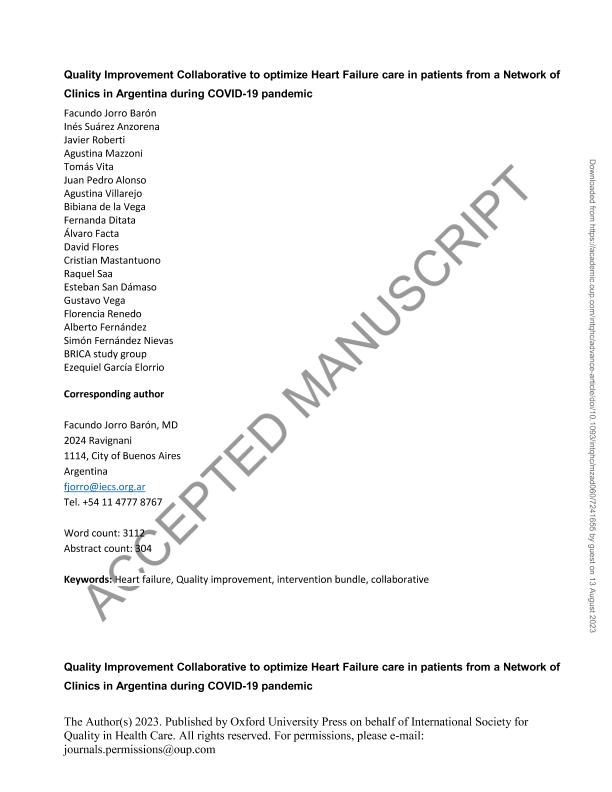Artículo
Quality improvement collaborative to optimize heart failure care in patients from a network of clinics in Argentina during the COVID-19 pandemic
Jorro Baron, Facundo Ariel; Suárez Anzorena, Inés; Roberti, Javier Eugenio ; Mazzoni, Agustina; Vita, Tomás; Alonso, Juan Pedro; Villarejo, Agustina; De La Vega, Bibiana; Ditata, Fernanda; Facta, Álvaro; Flores, David; Mastantuono, Cristian Exequiel; Saa, Raquel; San Dámaso, Esteban; Vega, Gustavo; Renedo, Florencia; Fernández, Alberto; Fernández Nievas, Simón; Garcia Elorrio, Ezequiel
; Mazzoni, Agustina; Vita, Tomás; Alonso, Juan Pedro; Villarejo, Agustina; De La Vega, Bibiana; Ditata, Fernanda; Facta, Álvaro; Flores, David; Mastantuono, Cristian Exequiel; Saa, Raquel; San Dámaso, Esteban; Vega, Gustavo; Renedo, Florencia; Fernández, Alberto; Fernández Nievas, Simón; Garcia Elorrio, Ezequiel
 ; Mazzoni, Agustina; Vita, Tomás; Alonso, Juan Pedro; Villarejo, Agustina; De La Vega, Bibiana; Ditata, Fernanda; Facta, Álvaro; Flores, David; Mastantuono, Cristian Exequiel; Saa, Raquel; San Dámaso, Esteban; Vega, Gustavo; Renedo, Florencia; Fernández, Alberto; Fernández Nievas, Simón; Garcia Elorrio, Ezequiel
; Mazzoni, Agustina; Vita, Tomás; Alonso, Juan Pedro; Villarejo, Agustina; De La Vega, Bibiana; Ditata, Fernanda; Facta, Álvaro; Flores, David; Mastantuono, Cristian Exequiel; Saa, Raquel; San Dámaso, Esteban; Vega, Gustavo; Renedo, Florencia; Fernández, Alberto; Fernández Nievas, Simón; Garcia Elorrio, Ezequiel
Fecha de publicación:
09/2023
Editorial:
Oxford University Press
Revista:
International Journal For Quality In Health Care
ISSN:
1353-4505
Idioma:
Inglés
Tipo de recurso:
Artículo publicado
Clasificación temática:
Resumen
Heart failure (HF) is a major clinical and public health problem associated with significant mortality, morbidity, and health-care costs. Despite the existence of evidence-based guidelines for the optimal treatment of HF, the quality of care remains suboptimal. Our aim was to increase the use a care bundle in 50% of enrolled subjects during their hospitalization and discharge and to reduce their readmission for HF causes by 10%. We conducted an uncontrolled before-after study in eight hospitals in Argentina to evaluate the effect of a quality improvement intervention on the use of an HF care bundle in patients with HF New York Heart Association (NYHA) Class II-III. The HF bundle of care included medication, continuum of care, lifestyle habits, and predischarge examinations. Training and follow-up of multidisciplinary teams in each center were performed through learning sessions and plan-do-study-act improvement cycles. Data collectors reviewed bundle compliance in the health records of recruited patients after their hospital discharge and verified readmissions through phone calls to patients within 30-40 days after discharge. We recruited 200 patients (83 before and 127 during the intervention phase), and bundle compliance increased from 9.6% to 28.3% [odds ratio 3.71, 95% confidence interval (8.46; 1.63); P =. 002]. Despite a slow improvement during the first months, bundle compliance gained momentum near the end of the intervention surpassing 80%. We observed a non-significant decreased readmission rate within 30 days of discharge due to HF in the postintervention period [8.4% vs. 5.5%, odds ratio 0.63, 95% CI (1.88; 0.21); P =. 410]. Qualitative analysis showed that members of the intervention teams acknowledged the improvement of work organization and standardization of care, teamwork, shared mental model, and health record completeness as well as the utility of training fellows. Despite the challenges related to the pandemic, better care of patients with HF NYHA Class II-III was possible through simple interventions and collaborative work. Graphical abstract.
Palabras clave:
COLLABORATIVE
,
HEART FAILURE
,
INTERVENTION BUNDLE
,
QUALITY IMPROVEMENT
Archivos asociados
Licencia
Identificadores
Colecciones
Articulos(CIESP)
Articulos de CENTRO DE INVESTIGACIONES EN EPIDEMIOLOGIA Y SALUD PUBLICA
Articulos de CENTRO DE INVESTIGACIONES EN EPIDEMIOLOGIA Y SALUD PUBLICA
Citación
Jorro Baron, Facundo Ariel; Suárez Anzorena, Inés; Roberti, Javier Eugenio; Mazzoni, Agustina; Vita, Tomás; et al.; Quality improvement collaborative to optimize heart failure care in patients from a network of clinics in Argentina during the COVID-19 pandemic; Oxford University Press; International Journal For Quality In Health Care; 35; 3; 9-2023; 1-20
Compartir
Altmétricas



